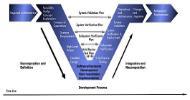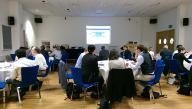
-

News on Systems-NET Opportunities
Collaboration Programmes: Immersive Secondments Visitor Scholar Scheme
-

Systems Engineering Process
Systems Engineering Life Cycle
-

News: Workshop Report now available
Research Grand Challenges for Systems Engineering
Featured Topic
The 21st Century presents tough global/societal grand challenges so complex that traditional engineering approaches come nowhere near to providing effective solutions; the rate of technology development and the scale of problems to be tackled are rapidly outstripping our collective understanding of how to manage the emerging complexity.
The level of complexity involved today requires a multi-disciplinary team to approach the intricate connections between traditional disciplines and emergent engineering developments. Unfortunately, technology alone cannot provide the answers –systems research is required to deliver innovative solutions integrating people, processes and technologies.
Systems Research is used here, to indicate the broad area of relevant research including complexity science, systems science and engineering, and has deliberately steered clear of a precise definition. However, it applies to complex systems in all sectors such as aerospace, automotive, construction, energy, healthcare, manufacturing and transport. The UK’s manufacturing and service industries require urgent transformational changes and new approaches in order to survive and secure a competitive edge; these can be achieved through systems research which has the potential to identify the changes needed and provide smart mechanisms to secure them.
An EPSRC sponsored workshop 'Systems Science Through to Engineering' recommended the creation of a transformative systems network for the UK Academic Research Community by drawing on, and consolidating the strengths of major systems centres and research groups across the UK. The aim is to share knowledge and communicate best practice between application domains.
Systems-NET has been established to meet this need and welcomes your participation in helping shape the future of systems engineering in the UK; in particular your views in identifying what are the grand challenges for systems engineering research are very important to us.
About Systems-NET
Systems-NET has been funded by EPSRC with the rationale of adding significant value to the UK’s industrial base by enabling development of key cross-sector engagements and contributing to solve some of the UK’s emerging and future societal challenges. The UK systems community (academia, industrial and other stake holders) has the potential to achieve this provided it takes a coherent approach that is driven by real needs.
Systems-NET will accomplish this by:
- Identifying new research directions for the systems community - these will be targeted by developing Systems Research Grand Challenges.
- Broadening the Research Base by contemplating research initiatives both in the UK and internationally
- Enabling delivery to industry by ensuring effective transfer of academic knowledge to industrial practice
- Disseminating for impact by preparing material and publications targeted to general and specialist viewers
- Funding diversity in the growing systems community and promoting sustainability
- Developing future leaders capacity and capability.
Systems-NET is central to the philosophy, aims, and expectations of EPSRC.
Systems-NET Principal Investigator: Professor Roy S. Kalawsky (Loughborough University)
Systems-NET Advisory Board
Systems-NET is pleased to have the support and committment of its Advisory Board who represent the wider community. Current Board members include:
Dr Kedar Pandya (EPSRC): Head of the Engineering Theme, EPSRC, Swindon
Professor Patrick Godfrey (University of Bristol): Professor of Systems Engineering at the University of Bristol, and Director of the Systems Centre and the EPSRC Industrial Doctorate Centre in Systems at University of Bristol and University of Bath.
Professor John McDermid: Professor of Software Engineering and leader of the High Integrity Systems Engineering Group (HISE) within the Department of Computer Science at the University of York.
Professor Alan Smith (University College London): is Director of UCL's Centre for Advanced Instrumentation Systems and Academic Coordinator of the Sira-UCL Postgraduate Training Partnership; Director of UCL's Centre for Systems Engineering (UCLse);
Professor Seth Bullock (University of Southampton): is Director of Southampton's new Institute for Complex Systems Simulation (ICSS). He is co-director of the University Strategic Research Group in Complexity in Real World Contexts (USRG Complexity), for which he runs a Complex Systems Simulation Seminar Series.
Professor Alex Duffy (University of Strathclyde): defined the first overall model of engineering design re-use, pioneered design performance, leading advances in design co-ordination and created unique models of learning in design.
Professor Philip Thomas (City University): Professor of Engineering Development.
Professor Ian Phillips (ARM): is Principal Staff Engineer at ARM Ltd, UK where his role is to make sure that scientific things which might have strategic value to Corporate ARM, yet are insufficiently quantifiable to be handled by the Divisions or the R&D group, have an identifiable home and champion.
Mr Ged Lancaster (Jaguar Land Rover): Ged is the Senior Manager for Systems and Software Engineering at Jaguar Land Rover. His responsibilities include ensuring that the delivery of all the embedded sub systems in the company’s vehicles is done robustly, consistently and with a scalability that will support the company’s growth well into the 21st Century.
Mr Alan Harding (INCOSE & BAE Systems): is also an active member of INCOSE, he represents BAE Systems internationally and within the company he chairs the BAE Systems P&S/I Systems Engineering functional working group. He is President of INCOSE UK – in this role he will provide the conduit between Systems-NET and INCOSE.
Professor David Oxenham (dstl): is a Fellow of the Defence Science and Technology Laboratory based at Porton Down in Wiltshire and is the Chief Systems Engineer.
Dr Jordan Giddings (dfT) : is Deputy Chief Scientific Adviser for the Department for Transport as Deputy to the departmental Chief Scientific Adviser. Beyond his roles in Transport, Jordan also leads on a number of Information and Communications Technology initiatives for the Home Office.
International Board Members
Professor Dinesh Verma (Stevens Institute, USA): is the Executive Director of the Systems Engineering Research Center (SERC), the first University Affiliated Research Center established by the DoD for Systems Engineering Research.
Professor Stephen Cook University of South Australia – Adelaide): is the Director of the Defence and Systems Institute and the Technical Director - Systems Engineering of the Defence Systems Innovation Centre.
Objectives
Systems-NET is a platform of fundamental and translational network activity; its key objective is to form a base of skilled systems expertise across the UK that can function as a ‘go-to’ resource for the systems research community. Systems-NET aims to strengthen connections between university research and industrial applications so that the expanding complexity of present and future systems can be described, analysed and understood.
Specific objectives of Systems-NET include:
- Creating a critical mass and ensuring continuity of systems expertise in the UK - Promoting systems engineering across disciplines enables growth and results in interdisciplinary work benefits.
- Generation of community agreed grand challenges to stimulate systems research of high relevance and impact - Enabling the development of integrated strategies for interdisciplinary working for optimal coordination and better execution of projects.
- Adoption of a strategic approach that continuously reviews and anticipates systems research opportunities and emerging industry needs
- Shaping the UK’s systems domain capability and promoting the development of future leaders in the sectors of advanced manufacturing, aerospace, automotive, built environment, defence, energy, healthcare, ICT, rail, transport and the utilities
- Identification of key priorities to provide researchers with either signposting or clear strategic direction to opportunities in systems research.
- Co-developing with academia and industry a cohesive research portfolio that meets international excellence and national importance
- Creation of a community within UK academia with a forum for research interaction and the organisation of regular networking events such as workshops, seminars and secondments
- Delivery of a high profile programme of debate and dissemination of activities geared to the growing systems communities, spanning policymakers, academia, industry and the public.






